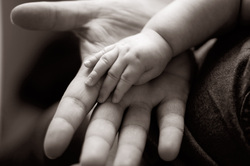Please share the event and flyer with anyone whom may be interested.
|
Iranti, Matimba, GALA, a determined parent and myself are working at creating a support space for parents and caregivers of transgender and gender diverse youth as well as a social space for the youth.
Please share the event and flyer with anyone whom may be interested.
0 Comments
 Babies have a rich mental life, and just like children and adults they can also experience psychological difficulties. Infants may not be able to convey their distress through language but often express their difficulties through restlessness, aggression, sleep, eating, elimination, relationship and developmental problems. Babies' foundational way of knowing and experiencing the world is through their primary caregiver/s. The bond between the infant and their primary caregiver/s (commonly referred to as attachment) plays a huge role in an infant's mental and physical health. This bond can be disrupted for various reasons: due to difficulties within the infant (such as medical problems), difficulties within the primary caregiver/s (for example depression or loss) or in the dynamics between infant and caregiver (for instance a baby with a difficult temperament and a mother with low internal resources due to stressful circumstances). Due to the importance of this bond and the baby not being able to experience psychotherapy by themselves, a strategic intervention for difficulties in infant (and sometimes parental) mental health is parent infant psychotherapy (PIP). In PIP both infant and parent/s are present in the room. The therapist particularly focuses on the relationship between the infant and their caregiver/s to help manage stress and work through psychological tensions in and between the baby and their caregiver/s. The therapist also provides the dyad (or triad) with support and guidance. Columbia University's Center for Psychoanalytic Training and Research describes what parent infant psychotherapy is a different way and provides a useful case example to better understand what PIP may entail.  Building and maintaining a good relationship with your child's school can have various benefits, such as: - having a better understanding of your child's development - being involved in preventing educational and behavioural problems - demonstrating to your child how invested you are in them and their education - being better able to support your child - improving your child's attitude towards school and school attendance - potentially improving your child's academic performance and overall functioning; and - potentially allowing your child to go further in their education But how do you build and maintain a good relationship with your child's school? The article, Building a relationship with your child's school, provides some excellent practical advice on how to build and maintain this relationship. The article thoughtfully takes into account different parents' capacities (working or not working, amount of time available, own strengths etc.) and how to build the relationship at different levels of schooling. The article is written by the Raising Children Network, an Australian parenting website. The website is a great resource for parents, families and teachers and offers valuable information on topics across your child's development.  Anxiety is a part of everyday life, but how do we approach it? Is it something taboo? Something to avoid at all costs? As parents, teacher and healthcare professionals do we not allow children to sit with or face anxiety? In the following article social worker and psychotherapist Lynn Lyons proposes that society (in her case American society but I think there are applications to South African society) catastrophises anxiety and because of this does not allow children to sit with any anxiety: "In short, kids and parents are often so anxious about anxiety itself that they must prevent even the least anxious twinge—any feelings of uncertainty and discomfort. As anxious parents try to reassure, comfort, explain, argue, punish, and bribe their child out of the anxiety, they grow more and more emotionally reactive, angry, and distraught, even bursting into tears before ultimately capitulating. ...As a society, we’re obsessed with security, safety, and predictability. As good parents, we tend to think that we should keep our children from ever feeling afraid, upset, or vulnerable. After all, we have technology for keeping in constant touch with our kids, reassuring them and ourselves that we always have their backs. It makes us and them feel better, too, so why not use it?" Lyons' argument is therefore that not allowing children to sit with anxiety fosters more of an intolerance to anxiety and thus even more anxious children. She emphasises the importance of teaching children to tolerate and cope with anxiety. Anxiety is an important part of our everyday lives - it is something we need to work with and use. How many significant events in your life have been free of anxiety? Large decisions? Public speaking? Emergency situations? Motivating your self to complete daunting tasks (at school, university or in the workplace)? Lyons points out how handling anxiety is an important life skill for children (and adults): "Here’s why not: kids need to be problem solvers. They need to learn how to improvise when things go awry, to take the next step when plans fall apart, in order to grow up. Anxiety will come. So will disappointments, grief, and, occasionally, even disaster. Sometimes our imaginations will be enough to make us panic, but sometimes our imaginations are just practice for the real thing. Children need to learn how to function with anxiety in the passenger seat. When we overprotect them, we deprive them of the practice needed to manage in the world." The key message here is that we need to reformulate the way we think about and approach anxiety. This can be in our everyday lives as well as with more significant cases of anxiety that impact on our functioning. Ideally we could all manage our anxiety by ourselves but it is not uncommon that we sometimes need to seek professional help with our anxiety (especially when it disrupts our social and occupational functioning and quality of life). Lyons provides interesting case material of a family getting help for anxiety. Read her full article, Taming the Wild Things, here. While sometimes it is important to work at building tolerance to anxiety as pointed out by Lynn Lyons and her case material (in more Cognitive Behavioural therapies), there are also other times when it may be key to understand the underlying cause or causes of anxiety (as in more Psychoanalytic or Psychodynamic psychotherapies). The latter approaches may also effectively reduce anxiety symptoms while simultaneously creating meaning. I think it is also important to note that while children may need to learn to tolerate anxiety this level of anxiety needs to be age-appropriate and manageable for the child. It is up to parents to allow children to face anxiety but also to create healthy limits to what a child is exposed to.  Sexual orientation and gender identity are still a controversial topics in South African schools. Lesbian, gay, bisexual, transgender and intersex (LGBTI) youth, teachers and parents still face prejudice and discrimination on a daily basis. Many parents and teachers find it difficult to provide education on sexual orientation and gender identity. They may also battle to provide support for LGBTI youth. Furthermore, learners often do not have access to adequate resources on sexual orientation and gender identity. Gay and Lesbian Memory in Action (GALA) have recently launched a website providing resources for LGBTI youth, their parents, teachers and allies as well as for researchers. These free and valuable resources provide accessible overviews of sexual orientation and gender identity. They make recommendations about best practices, policy and education and empower learners, parents and teachers with the information they need. Find these highly recommended sexual orientation and gender identity resources here.  Do you find it awkward talking about sex? Does this mean you do not talk about sex with your partner, children, friends, doctor or community? What are the implications of not talking about sex? In the following TEDx Talk Debbie Herbenick shares useful personal examples of the dangers of not talking about sex. She also mentions how not talking about sex can impact on:
After watching this video you may feel quite different about what that awkwardness may cost you and the people around you. Herbenick challenges everyone to make sex normal and provides practical ways in which you can make sex normal.  Children may experience life very differently from adults. They often do not have the ability to fully process difficult experiences independently. They also lack the language and expressive abilities that adolescents and adults have. So just as adolescents and adults have "talk therapy", children have play therapy. In play therapy the therapist helps the child to express themselves through play (which comes a lot easier than talk) and assists them in processing their emotional difficulties in this child-friendly way. My colleague, educational psychologist Nikki Barnfather, describes the play therapy process in more detail: http://www.nikkibarnfather.com/1/post/2012/12/what-is-play-therapy.html  Parenting can be a challenging task by itself but with constant "DOs and DON'Ts" from family members, friends, professionals and the ever increasing media parents may feel overwhelmed, pulled in multiple (often opposing) directions and find it hard to find their own unique parenting styles. In the following article psychologist Judith Ancer provides helpful suggestions on the importance of finding a balance as well as useful practical tips on how to do this: http://judithancer.wordpress.com/2012/10/20/the-good-enough-parent/ |
Jonathan's BlogI use this blog to post links to articles and videos that may relate to some of my services or interests. This content may also be useful for potential clients as well as other people interested in psychology and self development. Archives
July 2021
Categories
All
|




 RSS Feed
RSS Feed